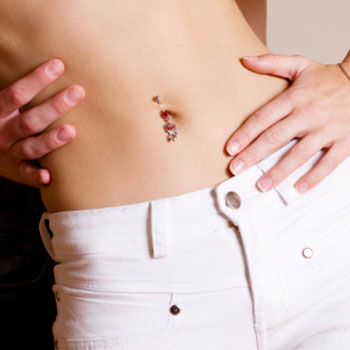Proper Piercing Protocol

Piercing various areas of the body may be trendy, but for centuries, different cultures have pierced their bodies for myriad reasons, such as cultural ranking, religious purposes and protection from evil. If you’re thinking about getting pierced, there are a few things you should consider. First, think about the area you’d like to get pierced. Healing times vary based on the location on your body. For example, an ear piercing will take six to eight weeks to heal. However, a lip or tongue piercing could take months to heal. In fact, due to the lengthy and sometimes complicated healing process – plus the damage a piercing can do to your teeth – the American Dental Association doesn’t recommend mouth piercings at all. A navel piercing can even take up to a year! And that’s if the piercing site stays healthy and infection-free. Generally, places that don’t get light and air – i.e., your mouth, which is a place that’s already rife with bacteria — will take longer to heal and be more prone to infection. The next thing to ponder before a piercing is your health. If you have a blood disorder that prevents blood from clotting well, then a piercing may not be for you. If you’re prone to keloids – thick scarring at the site of wounds – then a piercing could cause unsightly scarring around the site and perhaps obscure the hardware used for the piercing.
You should choose a professional piercer who sterilizes equipment in a hospital-grade autoclave, but also be sure you’re up to date on immunizations such as tetanus and hepatitis B. When you look for a piercing professional, ask about the process the shop uses to pierce. Guns should never be used, due to the difficulty in cleaning them between clients. An experienced piercer will use surgical gloves and a hollow needle, then will insert your choice of jewelry. There are two costs associated with piercings: the act of piercing the area and the cost of the jewelry, so be sure your budget can handle your desired piercing. Follow the piercer’s instructions to the letter when it comes to aftercare, or you risk infection. Wash your hands before you touch a piercing, and don’t allow anyone else to touch until it heals. Avoid alcohol and peroxide – these can cause the skin around the piercing to break down, and don’t apply petroleum jelly, which can keep air from reaching the site. Smoking, drinking alcohol and drinking caffeine can delay the healing process, so avoid those activities. If you have a mouth or genital piercing, it’s best to avoid sexual contact in those areas until the site heals in order to prevent infection and tearing. Consider the risks carefully before getting a piercing.
